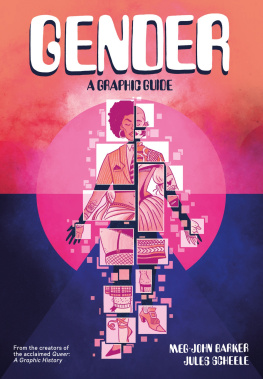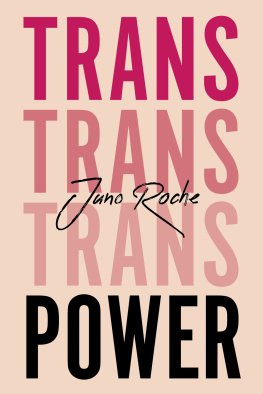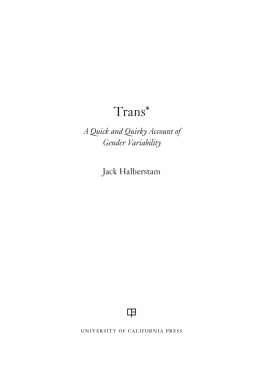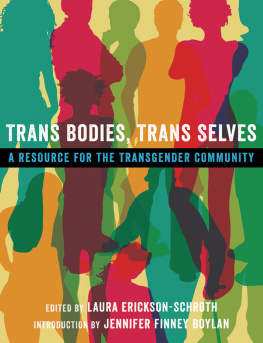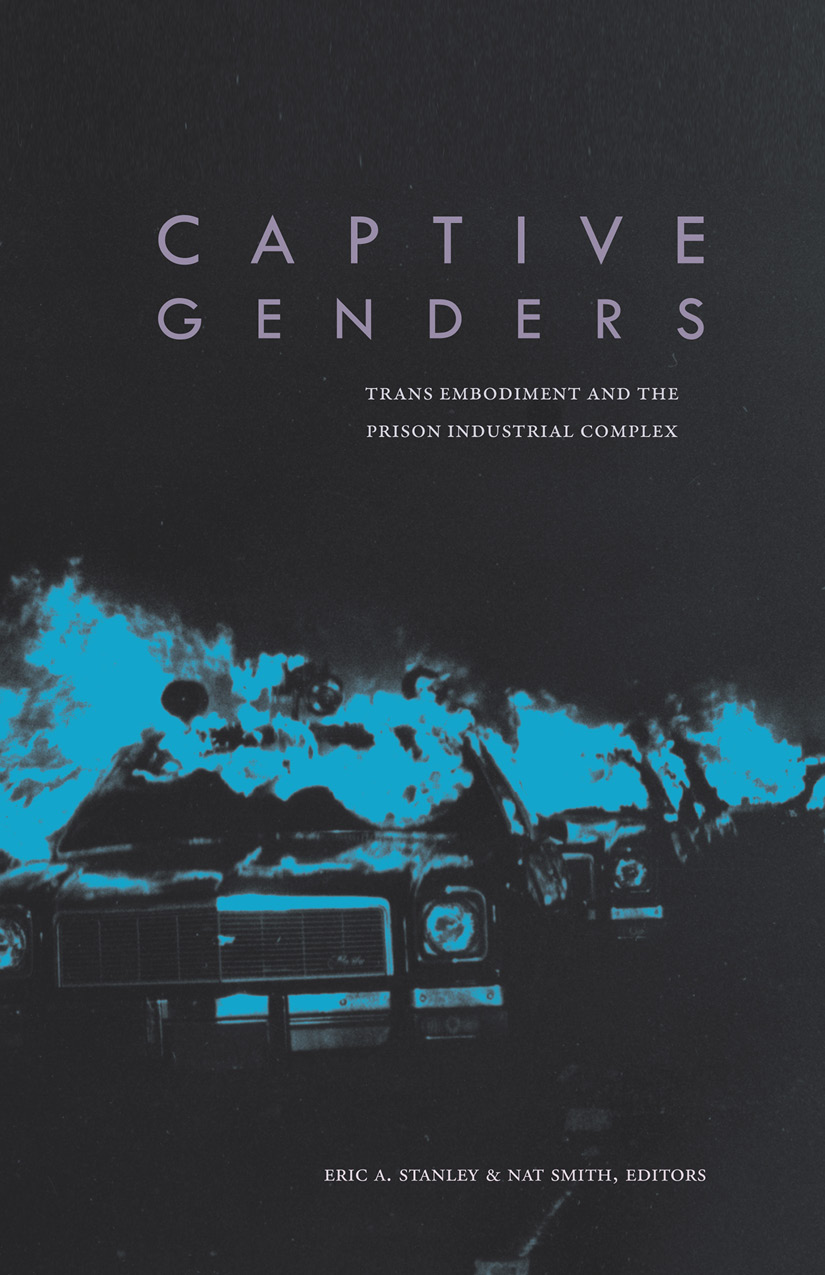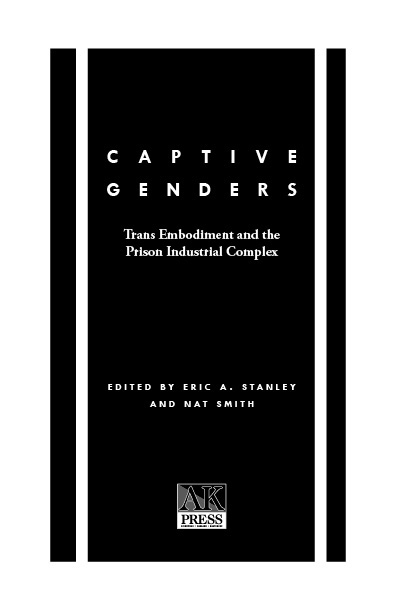Acknowledgements
Like all struggle we have not acted alone. We would like to acknowledge the labor, support, and guidance of the following people: Ralowe T. Ampu, Ryan Conrad, Angela Y. Davis, Jay Donahue, Jason Fritz, Ruth Wilson Gilmore, Donna Haraway, Rachel Herzing, Rebecca Hurdis, Kentaro Kaneko, Colby Lenz, Matt Luton, Toshio Meronek , Jos Muoz, Yasmin Nair, Isaac Ontiveros, Julia Chinyere Oparah, Adam Reed, Andrea Ritchie, Chris Smith, the late Will Smith, Dean Spade, Mattilda Bernstein Sycamore, Chris Vargas, and Ari Wohlfeiler.
Working with organizations, collectives, and with unaffiliated people is essential to grounding the analysis put forth by this book. While central to the project of abolition, writing must always be produced within the context of action. Similarly, action devoid of analysis often makes for shaky ground upon which to build.
AK Press has been supportive of this project from its beginning many years ago. We are also grateful for the people who have and continue to organize with the Bay Area NJ4 Solidarity Committee, Critical Resistance, Gay Shame, the Sylvia Rivera Law Project, Transgender, Gender Variant, and Intersex Justice Project, and the amazing people who organized Transforming Justice, the groundbreaking conference held in 2007.
Captive Genders is evidence of a collective dedication to abolishing the prison industrial complex (PIC). When we first started talking about a possible writing project in 2006 we wanted to push the LGBT movement towards a deeper understanding of the role the PIC plays in our lives. Specifically we wanted to focus on the ways in which the LGBT mainstream, through its racist logic, relies on the PIC and is used by the PIC to criminalize transgender, gender variant, and queer people. We also wanted to push the anti-prison and PIC abolition movements to more centrally incorporate and foreground the struggles of transgender, gender variant, and queer people.
We started by making it clear that we wanted to emphasize writing from folks currently inside as well as former prisoners. Importantly, discussions of exploitation, inclusion without tokenization, and risking prisoner safety due to the content of our correspondence were in the forefront. We attempted to contact all of the members of Transgender, Gender Variant, and Intersex Justice Projects contact list as well as our personal contacts. The Sylvia Rivera Law Project and additional organizations encouraged members to contribute.
Of the hundred or so letters sent out and ads posted in prisoner publications, we received relatively few responses. This makes sense because prison mail is unreliable as guards will often tamper with or simply destroy it, whether it is considered contraband or they just dont feel like sorting mail that day. Furthermore, guards sometimes hold a vendetta against activist and/or othered prisoners and frequently disappear their mail. While our letters explained openly and honestly what we were attempting to accomplish, some folks inside were understandably wary from being burned by supposed claims of support by others in the past and declined to submit. While we recognize that access to writing resources, supporting documents, and editorial assistance are limited if not completely absent inside, only a small number of the submissions were editable within our timeframe and our own limited resources. Additionally and unfortunately, authors of a few pieces we had chosen for publication were un-locatable as their housing had changed (and a few folks were released on parole!) and thus we could no longer contact them (though we tried). Because of these and other reasons related to mail communication and the busyness of our lives, it took a long time to gather pieces that we felt demonstrated a broad and essential scope.
Finally, a few contributions (from both within and outside prison) we were holding out for never materialized and there are definitely some important ideas and voices missing. However, we collectively covered a lot of important ground that will make room for even more organizing and writing in the future, and we invite you to join or continue your participation in both. Ultimately, Captive Genders is a powerful offering of struggle, innovation, comeuppance and sorrow; a call to arms and a cry for true, self-determined justice.
Fugitive Flesh :
Gender Self-Determination, Queer Abolition, and Trans Resistance
Eric A. Stanley
We always felt that the police were the real enemy.
Sylvia Rivera
Bright lights shattered the dark anonymity of the dance floor. The flicker warned of the danger of the coming raid. Well experienced, people stopped dancing, changed clothing, removed or applied makeup, and got ready. The police entered, began examining everyones IDs, and lined up the trans/gender-non-conforming folks to be checked by an officer in the restroom to ensure that they were wearing the legally mandated three pieces of gender appropriate clothing. Simultaneously the cops started roughing up people, dragging them out front to the awaiting paddy wagon. In other words, it was a regular June night out on the town for trans and queer folks in 1969 New York City.
As the legend goes, that night the cops did not receive their payoff or they wanted to remind the patrons of their precarious existence. In the shadows of New York nightlife, the Stonewall Inn, like most other gay bars, was owned and run by the mafia, which tended to have the connections within local government and the vice squad to know who to bribe in order to keep the bar raids at a minimum and the cash flowing. As the first few captured queers were forced into the paddy wagon, people hanging around outside the bar began throwing pocket change at the arresting officers; then the bottles started flying and then the bricks. With the majority of the patrons now outside the bar, a crowd of angry trans/queer folks had gathered and forced the police to retreat back into the Stonewall. As their collective fury grew, a few people uprooted a parking meter and used it as a battering ram in hopes of knocking down the bars door and escalating the physical confrontation with the cops. A tactical team was called to rescue the vice squad now barricaded inside the Stonewall. They eventually arrived, and the street battle raged for two more nights. In a blast of radical collectivity, trans/gender-non-conforming folks, queers of color, butches, drag queens, hair-fairies, homeless street youth, sex workers, and others took up arms and fought back against the generations of oppression that they were forced to survive.[1]
Forty years later, on a similarly muggy June night in 2009, history repeated itself. At the Rainbow Lounge, a newly opened gay bar in Fort Worth, Texas, the police staged a raid, verbally harassing patrons, calling them faggots and beating a number of customers. One patron was slammed against the floor, sending him to the hospital with brain injuries, while seven others were arrested. These instances of brutal force and the administrative surveillance that trans and queer folks face today are not significantly less prevalent nor less traumatic than those experienced by the Stonewall rioters of 1969, however the ways this violence is currently understood is quite different. While community vigils and public forums were held in the wake of the Rainbow Lounge raid, the immediate response was not to fight back, nor has there been much attempt to understand the raid in the broader context of the systematic violence trans and queer people face under the relentless force of the prison industrial complex (PIC).[2]





